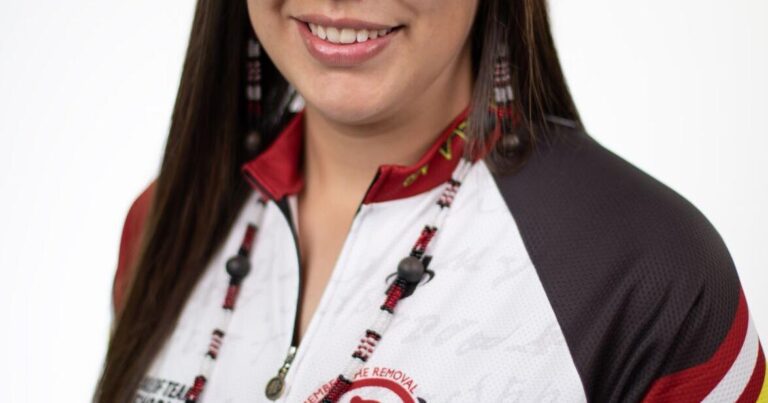TAHLEQUAH – Three students from Northeastern State University were recognized for their achievements after participating in various summer programs.
Amaiya Bearpaw, Bethany Mejia and Makiya Deerinwater have demonstrated their commitment to academic excellence, cultural preservation and community service while embodying the spirit of Indigenous leadership and heritage preservation.
Bearpaw, a citizen of the Cherokee Nation and a representative of the Choctaw Nation, participated in Remember the Removal, an annual bike ride totaling 950 miles from New Echota, Georgia to Tahlequah, Oklahoma. The Cherokee Nation created this program in 1984 where a group of youth ages 16 to 24 are accompanied by mentor riders and the Eastern Band of Cherokee Indians to rediscover the Trail of Tears.
The process begins with application, selection, interview and six months of physical training. Riders make several stops along the way, each with a significance in the history of the Trail of Tears.
“We stopped at many locations along the way, but my favorite and the most moving for me as a rider and citizen of the Cherokee Nation was Blythe's Ferry,” Bearpaw said. “This was the place where our ancestors saw the homelands for the last time before crossing the Tennessee River. This experience helped me gain a better knowledge of where my ancestors came from and why they moved away. I would do it again in a heartbeat.”
Bearpaw is graduating this fall with a degree in geography and sustainability studies and will work through a fellowship with the Trail of Tears National Historic Trail as part of the National Park Service in hopes of continuing to learn and preserve her heritage.
Mejia, a native of Arkansas and a citizen of the Cherokee Nation, spent her summer participating in the Native American Research Internship (NARI) at the University of Utah. NARI is a 10-week summer program that fully immerses Indigenous students in the world of biomedical research.
“My particular project worked with a current Parkinson's disease treatment that has proven toxic to patients,” Mejia said. “There were 28 students in the cohort who were placed in different research labs tasked with different projects.”
He said the students conducted research Monday through Friday from 9 a.m. to 5 p.m. When not in the lab, they were given many cultural opportunities such as attending powwows, hoop dancing and beading workshops, as well as medical workshops such as suturing, vitals and clinical shadowing opportunities.
“My favorite part of the program was how NARI was able to connect all of the research and professional development opportunities to the lives of Indigenous people,” Mejia said. “This experience gave me a new perspective on life as an Indigenous student. I want to encourage other Indigenous students to get involved and follow their dreams by attending great programs like this.”
Mejia is a junior at NSU studying cell and molecular biology. After college, she plans to apply to a graduate program where she can further her research experience while studying for the Medical College Admission Test (MCAT). From there he hopes to apply to MD/PhD programs around the country.
“Participating in NARI has drastically improved my professional skills and given me a new perspective on life beyond Oklahoma and Arkansas,” Mejia said.
Deerinwater grew up in Tahlequah, where her love and passion for art and design began in kindergarten, though she didn't feel confident about her work until she started classes at NSU.
“I found myself becoming more passionate about art when I started working on my degree courses at NSU,” Deerinwater said. “Until then I had only done sketches but nothing serious. After taking some of the core art classes for my degree, I knew this was what I wanted to do for myself and my career.”
As a citizen of the Cherokee Nation, Deerinwater participates in Native art exhibitions, showcasing her artistic abilities and deep cultural connections. This year, she participated in many art shows such as the Cherokee Nation Trail of Tears Art Show where her piece, “MMIW”, was awarded 2n.d position in the Graphics Department.
“Another show I participated in was the Cherokee Nation Homecoming Art Show that ran from August 12th to September 9th,” said Deerinwater. “My track 'Foot' was awarded the Bill Rabbit Legacy Award.
Her participation in these events highlights the importance of preserving Native art and storytelling, conveying the rich history and experiences of the Cherokee people.
Deerinwater is a junior at NSU studying fine arts with an emphasis in graphic design. After graduation, she plans to work full-time in the Cherokee Nation Language Department creating graphics and illustrations.
“I currently work part-time in that department and have created illustrations for some of their short story books,” Deerinwater said. “Overall, I want to learn more about the Cherokee language and improve my artistic skills by trying different mediums and getting out of my comfort zone.”
“I am incredibly proud of these ladies – each has challenged themselves in different ways to achieve their educational, career and personal goals,” said Sara Barnett, director of the Center for Racial Studies. “These are just a few examples of the success stories we see in our students each semester. We [NSU] they are so fortunate to have so many talented homegrown scholars invested in their culture and communities.”
CTS has been one of the central resources on campus since its inception in 1990. The center focuses on supporting academic effectiveness, improving the quality of student experiences, initiating academic activities, bridging communication between tribal nations and of the university and in enriching the cultural heritage of the NSU community.
To learn more about CTS and the opportunities they offer, visit cts.nsuok.edu or see them in person at their new location in the basement of the University Center on the Tahlequah campus.



